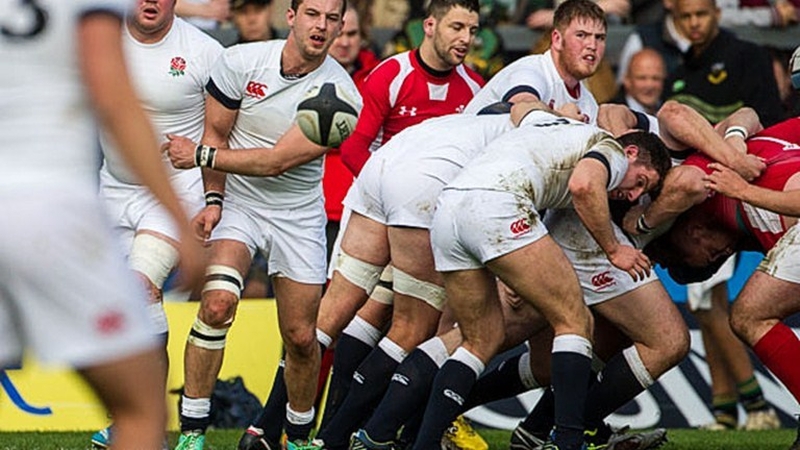The England Deaf Rugby player shares how the sport saved his life
Suicide is the most common cause of death for men aged 20-49 years in England and Wales. It’s a shocking statistic but one that does not come as a surprise to Craig Monaghan, mental health activist and rugby player at Sale Sharks.
“I’m not ashamed to admit that after leaving the army I tried to kill myself three separate times,” explains Craig Monaghan.
The Manchester-based rugby player first experienced mental health problems after returning to the UK from a post in Afghanistan.
“I fought in some of the bloodiest battles of the Afghanistan conflict and lost ten friends in battle and was badly wounded myself… the trauma of all the fighting and everything I’d seen really hit me when I got home.”
“I always say that fighting the mental battle with myself has been harder than fighting against the Taliban.."
Monaghan joined the army when he was sixteen-years-old and returned to civilian life at the age of twenty-three after being wounded in battle. Having never previously experienced adult life as a civilian, adjusting was hard.
“When I got back from Afghanistan, I think everyone just expected me to get on with things and deal with being deaf and struggling with my sight. Nobody really asked me how I was coping with everything,” he explains.
“… all of a sudden I’d lost that military bubble that comes with being an elite solider. I was back in normal society where nobody knew the terrible things I’d seen or what I’d been through.”
Two years after Craig’s return, the war in Afghanistan ended causing him much distress and feelings of guilt. It was then that his mental health took a turn for the worst.
“I remember around that time I would panic myself into a frenzy – a needless frenzy – but even something as simple as a smell would take me back to Afghanistan and mentally, I knew things weren’t right.”

A 2016 study into social pressures revealed that 61% of male respondents believe that men are stereotyped in the media. Four-out-of-ten males feel they lack the qualities and abilities that partners look for in a man and strongly agree that women have unrealistic expectations for men.
For Monaghan, the social expectation to always be strong made dealing with his mental health more difficult.
“I didn’t admit I had an issue at first. I had the view that men should be warriors and [so] when I did start to struggle mentally I just kept telling myself that it was wrong to think like that. I felt massively embarrassed that I was finding it difficult to cope and I didn’t want to admit that I was finding things tough.”
I'm not ashamed to admit that I've tried to kill myself three separate times.
“At the time I felt like I had a simple choice – commit suicide or face up to the person I’ve become because of what I’ve been through. I know that probably sounds extreme but that’s how I felt.
“Lots of men do have the belief that it’s their job to be masculine and house proud and look after their families, but it’s not possible to run a household if you’ve got a mental health problem that you’re not going to address," he adds.
“I actually think it takes more guts to show your emotions. I’ve definitely learnt that over the past couple of years and there have been lots of times when I’ve had to grab a hold of myself and have a word.
“I always say that fighting the mental battle with myself has been harder than fighting against the Taliban in Afghanistan.”
I’d encourage anyone to go and see their doctor if they feel that something isn’t right.
A 2016 survey from the Mental Health Foundation found that men are much less likely than women to seek mental health support. More than a third of men surveyed revealed that they would wait several years to speak to friends about their mental health, if at all.
For Monaghan, speaking to friend was the first hurdle in addressing his mental health problem. “The first thing I did to start tackling it was speak. Someone I know asked me how I was and I remember saying “do you know what, I’m not actually that great and I can’t seem to shake it off.” And once I spoke out, it became easier. It felt like a huge weight had been lifted off my shoulders.”
“Men need to speak out. And if they don’t feel ready to speak out then finding a focus is a big help. The moment people find something to focus their mind on, it can make a big difference in my experience.”
For Monaghan, finding focus through sport helped him deal with his mental health.
“Playing rugby saved my life. It gave me a reason to get up in the morning because I had something to train for and something to look forward to at the weekends. That desire I had to be the best was coming back again and through rugby the competitive side of my personality was coming back too.
“Playing rugby was the closest I could get to the person I was before I went to war.”

Monaghan now plays for the England Deaf Rugby team and is a coach for the Sale Sharks Forces, a programme that tackles social isolation as well as mental and physical wellbeing for ex-armed forces personnel. He also shares his mental health story to support Sale Sharks Community Trust programme ‘Balls to That’. The initiative offers free mental health sessions to businesses to learn about how they can support staff and colleagues.
“One of the reasons I wanted to work with Sale Sharks Community Trust was to give me a focus and to give something back.
“It’s rewarding for me to be able to help other people in the way I’ve been helped. A lot of people invested their time into me at the very beginning of my problems and I made a deal with myself that if I ever got through it, I would do everything I could to look after other people that were going through similar battles with their mental health.
“I think the only way we can change the stigma around men’s mental health is for more people to start speaking out. If public figures or celebrities with problems can lead by example and share their stories, I think it will have a domino effect and encourage other people to do the same."
“I do think lots of men will still struggle to open up to people. Because of that, I think there’s a responsibility for friends and family members to help anyone they think might be struggling. Just simply asking someone if they’re okay and taking the time to listen to them can make all the difference when it comes to tackling mental health.
“Men definitely need to look after themselves more. I’d encourage anyone to go and see their doctor if they feel that something isn’t right.”
For mental health support in Manchester:
Contact the Samaritans – dial 116 123 free from any phone
Contact Manchester Mind – dial 0161 769 5732




